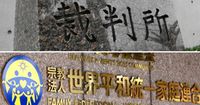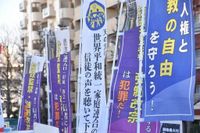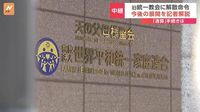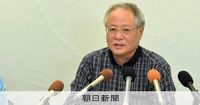On March 25, 2025, the Tokyo District Court issued a historic decision ordering the dissolution of the World Peace and Unification Family Federation, formerly known as the Unification Church, based on allegations of illegal solicitation of donations. This ruling marks a significant moment in the ongoing scrutiny of the church following a series of controversies, particularly the assassination of former Prime Minister Shinzo Abe in July 2022, which brought to light the impact of the church's high-pressure donation practices on its followers.
The Ministry of Education, Culture, Sports, Science and Technology, having investigated the church's activities after Abe's assassination, requested this dissolution order in October 2023. The ministry highlighted how the church had systematically engaged in high-pressure donation solicitations since around 1980, leading to substantial financial burden on its members. Court documents indicated that damages from these solicitations amounted to approximately 20.4 billion yen (around $140 million), affecting around 1,550 individuals.
Judge Tatsunori Suzuki noted in the court's decision that the church's actions represented “unprecedentedly large-scale damage in terms of both the number of people and the amount of money.” Furthermore, the ruling is particularly groundbreaking as it constitutes the first dissolution order centered on civil law violations rather than criminal acts, contrasting past cases like that of Aum Shinrikyo, which was based on criminal activities of its leaders.
The church, which became a recognized religious entity in Japan in 1964, is now faced with the potential loss of its religious corporation status. If the Tokyo High Court upholds the decision, the church will not only lose its legal personality but also the associated tax benefits, including exemptions on donations and properties. The church's spokesperson expressed disappointment, stating, “While we are disappointed, we take the decision seriously and will consider an immediate appeal to the Tokyo High Court.”
Underneath the legal proceedings, the personal stories of affected individuals shine through. One of them, Tatuo Hashida, 67, has openly shared his experience of suffering emotional and financial distress as a result of the church's practices. In a press conference held concurrently with the court's decision, Hashida emphasized that this ruling highlights the antisocial nature of the church's operations. “The dissolution order proves the antisocial nature of the Unification Church,” he said. He urged the church to acknowledge its responsibility for the economic and mental damages inflicted on victims.
Hashida’s situation is not unique; he recounted how his marriage fell apart due to his ex-wife's involvement with the church and her repeated high-value donations. His advocacy has been a crucial part of the broader movement calling for victim support and church accountability.
Initially, the ministry’s probe into the church was triggered by the assassination of Abe, which highlighted the deep connections between political figures and religious organizations in Japan. Tetsuya Yamagami, the individual charged with the murder, reportedly harbored resentment towards the church due to his family's financial ruin stemming from his mother's contributions to the organization. This tragic incident made the public more aware of the potential consequences of the church's practices.
With the court's ruling supporting the ministry's stance on the church's damaging practices, there is heightened urgency regarding the process of providing compensation to victims. The court-appointed liquidator, if the dissolution order is finalized, will oversee the disbursement of church assets among the claimants. Concerns linger, however, that before the dissolution is formalized, the church may maneuver its assets to related parties, rendering victim compensation more complicated.
“The challenge will be not just in the liquidation of assets but ensuring that funds are available to those who have suffered,” emphasized a legal expert involved in the case. The church, while it can continue its activities as a voluntary group post-dissolution, faces significant changes that could hinder its operations drastically.
Legal experts and victim advocacy groups have underscored the need for robust legal frameworks to secure victim compensation. The National Liaison Association of Lawyers Against Spiritual Sales has requested the government implement laws that could preserve the church's assets, grant appropriate authority to liquidators, and ensure victims are compensated post-liquidation.
This dissolution decision signifies a critical turning point in the handling of high-pressure religious donation practices and their impact on society. The Ministry of Education remains committed to ensuring future compliance and safety for those entangled with powerful religious organizations.
As this story unfolds in the courts, many are watching closely to see how it will influence not only the former Unification Church but also other religious organizations in Japan that face similar scrutiny over their fundraising methods. The decision may pave the way for more rigorous checks on religious entities, thereby increasing protections for potential victims.










